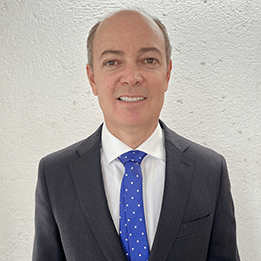

General counsel | Compañía General de Electricidad (CGE)



Ernesto Peñafiel Morgan
General counsel | Compañía General de Electricidad (CGE)
Team size: 12
What are the most significant cases or transactions that your legal team has recently been involved in?
Considering the last three years, the most relevant matters that my legal team has participated in have been the company’s sale and purchase process due to a change of controller; the division of the company to comply with regulatory changes; the tariff processes at the level of transmission and distribution of electrical energy, in all its stages, including the presentations to the Panel of Experts; tenders for works to expand the transmission and supply of the electric public service; negotiations for the termination of litigation derived from the COVID-19 period with electric companies that supply the demand of the majority of the company’s public service customers; and the interpretation and implementation of the subsidies and agreements contemplated in the Basic Services Law.
How important is choosing to work with external lawyers who align with your company’s values? Are you likely to reconsider what firms you work with based on this?
It is essential, since the advice provided by the chosen external lawyers is intended to provide an answer, position, or materialise some act or presentation of the company, which above all must be consistent with the values of the company. It is a significant aspect to consider when selecting the external law firms to work with.
Looking forward, what technological advancements do you feel will impact the role of in-house legal teams in the future the most? Which have you found most useful in your legal team?
It seems to me that the development of artificial intelligence could be very relevant, modifying and making the performance of in-house legal teams more efficient. Another aspect that I believe is having an impact and should be promoted is the development of technology to communicate more easily, even in an international context, with countries with different languages, cultures, and work schedules. In the case of General de Electricidad, we have this experience with a parent company that is Chinese, where technology has been especially useful to work with them, both in person and remotely.
What diversity, equity and inclusion initiatives have you and your legal department been championing within your company’s endeavours?
We constantly remind the company of its duty to comply with Law No. 21,015 on labour inclusion and the quotas it observes. Likewise, within our team, we continually promote gender equality, as well as due respect and tolerance for diversity of thought, beliefs, origins, culture, language, among others. This initiative has become very practical when forming part of teams with lawyers of Chinese origin and international experience in Asia and Europe.
As we live in a fast-paced world today, what skills will a corporate legal team need to succeed in the modern in-house industry?
Coporate legal teams will need to have the flexibility to adapt to the constant changes, demands and modalities of international controllers, the ability to communicate and work with multidisciplinary teams and maintain clarity and assertiveness in the counsel to protect the interests of the company, and ensure the faithful fulfilment of the fiduciary duties of directors and officers.
How do you suggest in-house lawyers build strong relationships with business partners?
I believe that in-house lawyers can build strong relationships with business partners through active participation in internal committees or work teams. Lawyers can also build this relationship through training and periodic reports to shareholders on corporate governance, regulation of the company sector, and opportunities for development.
The unusual business environment created by the pandemic has been swiftly followed by other shocks. Are you now putting more emphasis on preparing for the unforeseen and, if so, what does this entail?
The pandemic taught us many lessons at the national and international level. In our case, it reinforced the importance of communicating and being permanently connected at the company, industry, and stakeholder level. This is a key factor as it allows us to make timely and accurate decisions. The worst contingency for organisations like ours is to be incommunicado.
Director of legal services | Compañía General de Electricidad